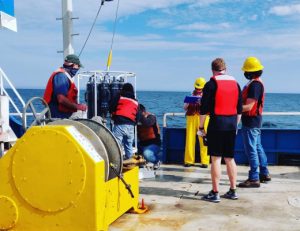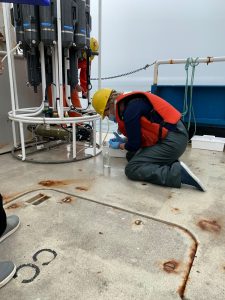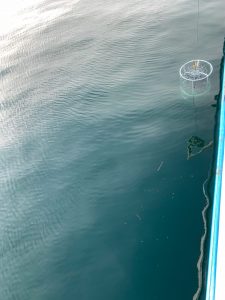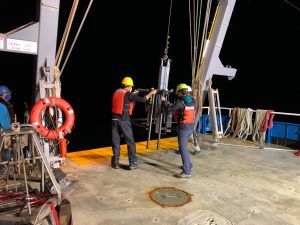By Samantha Siedlecki
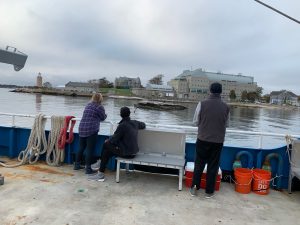 In the spirit of Jacques Cousteau’s sentiment: “The future is in the hands of those who explore…,” nine graduate students, two faculty, and the crew of the R/V Connecticut ventured out into the Long Island Sound and offshore waters of the Mid-Atlantic Bight on two separate occasions in October, 2020. The Expedition Course entitled: Connecting urban estuaries to the sea: Coastal oceanography of Long Island Sound and the shelf of the Mid-Atlantic Bight is offered to the graduate students every other year.
In the spirit of Jacques Cousteau’s sentiment: “The future is in the hands of those who explore…,” nine graduate students, two faculty, and the crew of the R/V Connecticut ventured out into the Long Island Sound and offshore waters of the Mid-Atlantic Bight on two separate occasions in October, 2020. The Expedition Course entitled: Connecting urban estuaries to the sea: Coastal oceanography of Long Island Sound and the shelf of the Mid-Atlantic Bight is offered to the graduate students every other year.
This past fall, the course was offered amidst the pandemic, but ship operations had already designed protocols to safely continue operations aboard the R/V Connecticut, and the University agreed to support testing of the students to participate in the course. As a result, the course proceeded, albeit with some adjustments for safety amidst the pandemic. The students were excited and eager to have their first at-sea research experience and the faculty were eager to revisit the transect they had observed in the class two years before. The 2018 class found that conditions improved with distance from shore – it was actually warmer sampling out there because the ocean water was so warm – consistent with the increased influence of the Gulf Stream waters in the region that has been observed. Sure enough, when the 2020 course embarked onto the outer shelf, they encountered similar warm conditions. When the students lowered sensors on the outer shelf to measure temperature, salinity, chlorophyll, oxygen, and pH throughout the water column, they discovered a salty subsurface intrusion that brought with it higher pH, nutrient rich water and completely different species than further inshore.
Back at the lab, the samples were analyzed and the results plotted and mapped. Inspired by their exploration of the coastal waters nearby, the students wrote proposals in small groups about what they would like to investigate further in the future with this experience and ended up generating some very interesting hypotheses about the nearby coastal ocean. They ranged from questions about the influence of the outflow from Long Island Sound on the phytoplankton composition on the shelf, to mechanisms driving the pH variability associated with the salinity intrusion on the outer shelf, and the influence of temperature on the cross-shelf trends in the biological pump characteristics. Many faculty and staff contributed to the success of the class, and the crew went above and beyond to ensure we got what we needed at sea. The future is in good, grateful hands.
